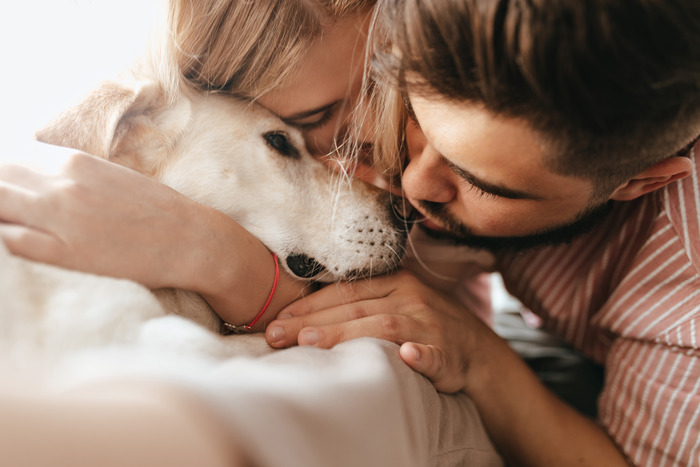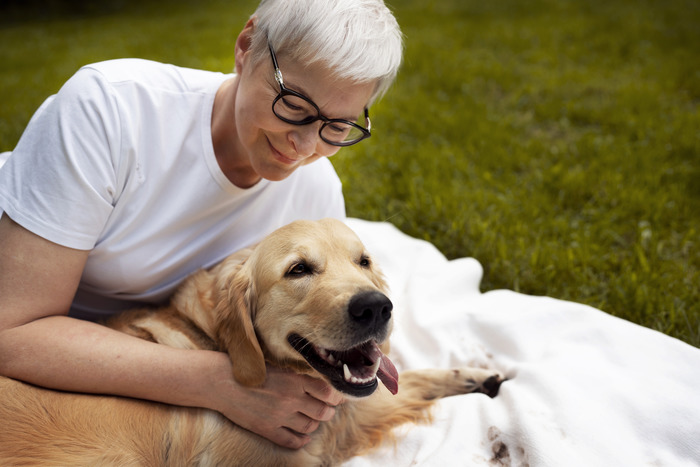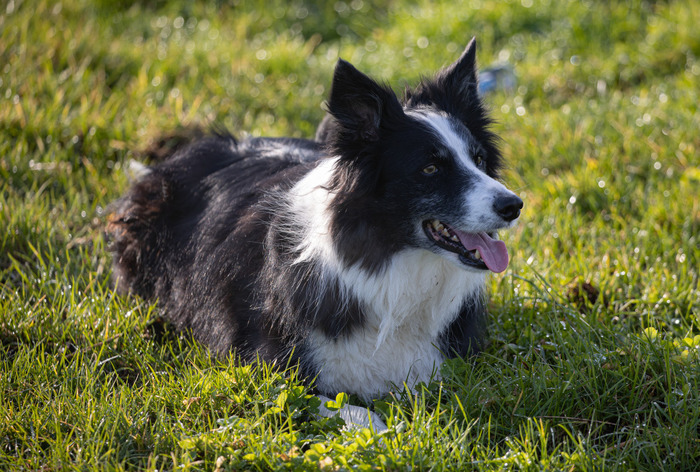(3)
Spend more to get free priority shipping
Great. You will get complimentary priority shipping for free.
Previous registration has been removed from the cart as only one animal registration is allowed at a one time.
Please note that there is no unified Assistant Animal database registration in the USA.
You cannot verify information from other registrars on the ESACERT.com website
Anxiety sufferers have different complications of their health conditions that make life difficult. However, there are ways to ease this state and improve individuals' lives. For example, owing a pet, service dogs, emotional support animals, or therapy companions might help in that process. They are friendly, intelligent, and capable of performing ...


Anxiety sufferers have different complications of their health conditions that make life difficult. However, there are ways to ease this state and improve individuals’ lives. For example, owing a pet, service dogs, emotional support animals, or therapy companions might help in that process.
They are friendly, intelligent, and capable of performing duties to help their handlers. So, in this article, you may find the best dog for anxiety and depression to boost your mood and provide comfort.
Labradors are considered ideal for service animals due to their amiable temperament, continuous nature, and capability to perform various tasks. These features make them right for roles like psychiatric service dogs, guide dogs, and emotional support dogs.
Labradors adapt well in places where training takes place, as they have a tendency to ‘listen and obey commands’. However, because of their high energy level, they need regular exercise to be capable of doing what they are told and offer a boost to individuals with anxiety or depression.

They are friendly and like to cuddle, which makes them ideal for dispelling anxiety since they are always there to comfort the patient. Further, Labradors can also perform tasks, such as picking up medications, offering touch to calm their owner, and distinguishing the signals of an anxiety attack.
To many, a Labrador Retriever is not only a companion but a savior with the presence of mental disorders, which hugely improves their overall well-being.
Quite possibly the most well-known dog breed, the Cavalier King Charles Spaniel is a so-called cuddle buddy, perfect for anyone who wants a psychiatric service dog. What is particularly characteristic of this breed is its shyness, soft temperament with a desire to play, and interesting, sensitive facial animation that attracts the owners’ attention.
They have a composed appearance and diminutive size and are ideal for offering affection and company and, more specifically, in apartment living.

These social animals require interaction with humans from time to time and are sensitive to the emotions of their owners. Hence, the mere fact of their being around can at least show a positive predisposition that challenges anxious and depressive conditions as well as have an overall beneficial healing and comforting role.
In addition, they do not engage in rigorous exercise and don’t need large areas like bigger dog breeds, which makes them good for those who find it difficult to handle large dogs. All of this makes Spaniels not only pets but also friends who are able to improve the emotional state of owners with mental diseases.
These are ideal therapy dogs because they are friendly, eager to help, like to exercise and help people. Their sociable disposition and natural predisposition to respond non-threateningly to different people make them ideal for environments like hospitals, schools, and nursing homes, where therapeutic animal interaction is needed.
Retrievers have rightly earned the status of friendly and affectionate dogs, attributes that help in their support and therapy tasks.

They are intelligent and naturally want to help people. Due to their obedience, they are easily trained and excellent at fulfilling various support tasks, greatly assisting people suffering from adverse health conditions. They work in helping with comfort during therapy sessions.
Whether it’s a physical therapy session or any other therapy session, Golden Retriever can happily assist with a welcoming wag of the tail while keeping a friendly demeanor. Similarly, their availability to be there regularly on a daily or weekly basis could positively impact their anxiety relief, reduction of loneliness, their constant provision of comfort, and their ability to create stability for the reassurance of someone who needs it.
German Shepherds are known to be intelligent, loyal companions and great watchdogs, especially for those with anxiety and depression. Originally bred for herding sheep, these intelligent dogs can be trained to watch over their owners for signs of stress or depression, pick up prescription medicine, and support physically challenged persons, assisting with mobility issues.

Because of the good bond with the owner and the keen sense of duty found in the dogs, they are suitable for jobs or assignments involving physical and emotional support. German Shepherds are also utilized as psychiatric service animals, meaning in their work, they are expected to be able to execute numerous crucial tasks concerning mental disorders.
Due to the breed’s acute perception of its owners’ moods, it’s great at reducing anxiety or preventing depressive episodes is superb. It is important to note that handlers get a feeling of more safety and less stress due to the presence of the German Shepherd. So they become more than just emotional support dogs but often play the role of comfort buddies for humans.
Border Collies are intelligent, well-behaved, and energetic dogs that can stimulate any owner, especially people who suffer from anxiety or depression. Developed for the purpose of driving sheep, these dogs have a strong working instinct that puts them right at the side of people, so it is easy for them to do all the things that can help in treating one’s mental condition.

Their superior intelligence and physical flexibility make them suitable for working as aversion animals with their owners, where they are trained to perform certain acts that may assist people in coping with various stresses of life.
For instance, with special training, this breed can come and pick something comforting or approach their owner to cuddle them when they see symptoms of anxiety, like high blood pressure.
However, the physical demand for frequent and intense activities proves the breed is ideal for those willing to adopt an active lifestyle synergetic with an improved mental state. The physical activity during training sessions and the cognitive activity triggered by training and playing with a Border Collie can greatly enhance the person’s mood and improve their health.
Other dogs can assist in psychological issues, with each of these having its own characteristics, making them suitable for this role. Smaller dogs provide the same amount of support and love as other pets. For example, the Pembroke Welsh Corgi have small stature and short legs, but despite this, they are cute and provide a lot of comfort to people, mainly because they are loyal protectors.
Langer breeds also can be extremely helpful for individuals with mental disorders. For instance, the Great Dane is generally regarded as a friendly giant or even a protector. For many people, such breeds provide an even higher level of comfort, giving a sense of protection and safety.
Certain breeds with desired traits, including low shedding or hypoallergenic dog hair, can also be useful for allergy sufferers, thus ensuring that people receiving therapy receive support for their mental health and discomfort from pet hair. Dogs of all sizes, like the Corgi or the Great Dane, show how amazing dogs can assist with anxiety and depression.
Selecting an appropriate dog breed for emotional support requires the consideration of specific factors to determine the breed that will properly satisfy a particular need. Service dogs who are trained to assist, including performing specific tasks, are very useful if they are trained according to the needs of a person suffering from depression and anxiety.
For instance, having an own psychiatric service dog that has been trained to wit and respond to panic attacks can boost emotional state greatly.
Calm breeds are normally considered ideal since with such a therapy dog, depression, anxiety, and other psychological issues are much easier to survive. They are mellow and tend to put people at ease.
These dogs provide unconditional love, which is valuable in fighting mental disorders. Also, the decision to get an emotional support dog involves ensuring that such a dog gets proper veterinary care, which is important in enhancing the dog’s health and offering support to the owner. Don’t forget to register your pet as an emotional support animal.
Choosing a therapy dog is a very deliberate process that involves considering the dog’s personality and the tasks that the dog is expected to perform. It’s all about improving the owner’s quality of life and minimizing the effects of depression and anxiety.
What is the best breed for anxiety and depression?
Labradors, Golden Retrievers, Cavalier King Charles Spaniels and Border Collies are top choices for emotional support for people with anxiety and depression.
Why are Labradors good for service animals?
Labradors are friendly, obedient and can do many tasks, they are great companions for people with mental health issues. They can sense anxiety and offer comfort, they are perfect service animals.
Can Cavalier King Charles Spaniels help with mental health?
Yes, Cavalier King Charles Spaniels are affectionate, sensitive and perfect for comfort for people with anxiety or depression. They are small and gentle, lap dogs for emotional support.
How do Golden Retrievers help in therapy?
Golden Retrievers are intelligent and love to help. They are used in therapy settings because they are calm, friendly and can provide comfort and stability to people during therapy sessions.
Are German Shepherds good for emotional support?
Yes, German Shepherds are intelligent, loyal and can detect signs of stress or depression. They have a sense of duty and are great for supporting people with mental health conditions.
What makes Border Collies good for mental health support?
Border Collies are highly intelligent and energetic. They can help with anxiety and depression through active engagement and can recognize symptoms of anxiety, they are perfect for offering comfort.
Can smaller breeds be good for anxiety and depression?
Yes, smaller breeds like Pembroke Welsh Corgi can provide just as much emotional support as bigger dogs. They are loyal, affectionate and protective, great companions for people with mental health conditions.
What to consider when choosing a dog for emotional support?
When choosing a dog for emotional support, consider the dog’s temperament, your lifestyle and the tasks the dog will do. Calm, affectionate breeds are often preferred for people with anxi
Your current registration:
After change, your registration will be:
Your current registration:
will be replaced with:
You have entered the maximum number of characters
You have entered the maximum number of characters
You have entered the maximum number of characters
You have entered the maximum number of characters
You have entered the maximum number of characters
EC-0000001
Oct 26, 2025
-
-
-
-
-
-
You have entered the maximum number of characters
You have entered the maximum number of characters
You have entered the maximum number of characters
You have entered the maximum number of characters
You have entered the maximum number of characters
You have entered the maximum number of characters
You have entered the maximum number of characters
Enter at least 3 characters to search. You have entered: